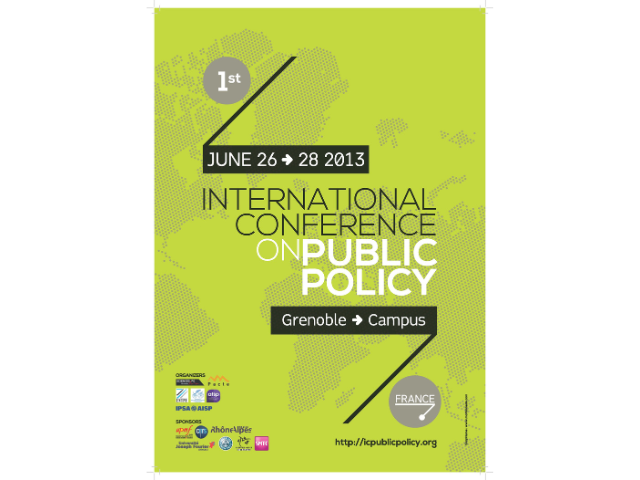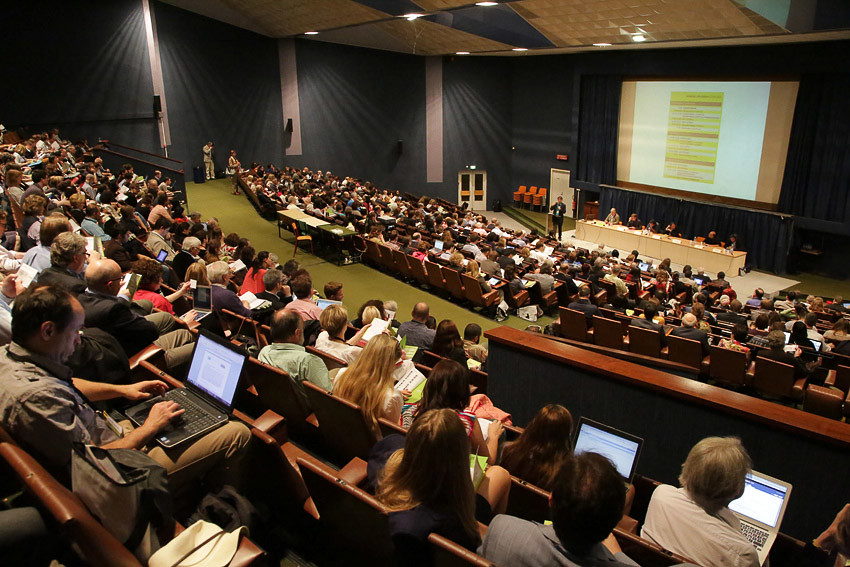Thank you for your message. The IPPA team will get back to you shortly. You first need to login here.

ICPP1 2013 - Grenoble
ICPP1 took place at Sciences Po Grenoble (France) from June 26-28, 2013.

ICPP1 took place at Sciences Po Grenoble (France) from June 26-28, 2013.


Chair: B. Guy Peters, University of Pittsburgh
This roundtable examines the different existing approaches to, or schools of, public policy in the light of recent research work on the subject. In the policy field, there are currently several different paradigms used to study policy-making. New institutionalism, Interpretative analysis, agency problem, Advocacy Coalition Framwework, Institutional Analysis and Development and Punctuated Equilibrium theory are explored in this panel. Each participant of this roundtable has played a central role on one of these approaches and will explain what this approach has contributed to our understanding of policy-making ? What is the history of this approach ? And what are the latest developments in research and practice related to it?
Speakers:
Chris Weible, University of Colorado, USA
Frank Fischer, Rutgers University, USA
Eduardo Araral, Lee Kuan Yee School of Public Policy, Singapore
Helen Margetts, Oxford University, UK
Patrick Hassentaufel, University of Versailles-St Quentin
Nikos Zahariadis, Rhodes Unviersity, USA
Chair: Philippe Zittoun, University of Lyon
Discussant: Claudio Radaelli, University of Exeter
Globalization is an important, but not the only, reason for the current interest in the harmonization of national policies. Among other reasons leading to demands to reduce domestic diversity among nations one may mention: the notion that without harmonization the case for mutual gains from free trade is invalid; the need to avoid a “race to the bottom” in the provision of environmental protection; and, more generally, “fair trade” arguments that, in the absence of harmonization, the higher-standard countries will face pressures to lower their own standards in order to compete internationally. In the European Community/Union harmonization of the national laws and policies of the member states was one of three legal techniques the Rome Treaty made available for establishing and maintaining a common market—the other two techniques being liberalization and the control of anti-competitive behaviour. Initially, both the Commission and the European Court of Justice favoured “total harmonization”, i.e., detailed measures excluding previously existing national policies. By the mid-1970s, however, it became clear that the available institutional and normative resources were insufficient, and the emphasis shifted from total to optional and minimum harmonization, and to mutual recognition. This trend was reversed by the decision to move to full monetary union, i.e., to the total harmonization of national monetary policies. The long history of policy harmonization in the EC/EU provides a good empirical basis for a more general analysis of the benefits and costs of this approach to transnational policymaking. Both costs and benefits depend very much on the level of socio-economic and institutional similarity of the countries involved. Net benefits decrease with growing dissimilarity; hence the need to find alternatives to harmonization--not only in the case of the EU. The main alternative to centralized harmonization is competition among different approaches to comparable policy problems. My presentation will therefore concentrate on inter-state and inter-jurisdictional competition, viewed as a process of imitation and learning. Contrary to widespread opinion, competition does not exclude cooperation. Given the appropriate competitive stimuli, policymakers will consult with colleagues at home and abroad, collaborate with them on certain projects, perhaps even integrate some operations. The end result may still be harmonization, but ex-post harmonization, based on imitation and learning, rather than ex-ante, top-down harmonization.
Moderator: Leslie Pal, Carleton University
This roundtable will be on the main journals in public policy – what are their aims, what topics do they cover, what is their contribution to the field, and are there distinct styles of work within public policy that are represented in different journals or does pluralism reign? What do the journals contribute to the study of public policy? What more can journal editors do to help shape the discipline? What can scholars of public policy do to sustain journals? The panel will be an opportunity to hear the perspectives of the editors about their outlets, and to have a debate about the role of journals in the discipline.
Speakers:
The Journal of Public Policy applies social science theories and concepts to significant political, economic and social issues and to the ways in which public policies are made. Its articles deal with topics of concern to public policy scholars in America, Europe, Japan and other advanced industrial nations. The Journal often publishes articles that cut across disciplines, such as environmental issues, international political economy, and politics regulation, and European Union processes. Its peer reviewers come from up to a dozen social science disciplines and countries across three continents, thus ensuring both analytic rigour and accuracy in reference to national and policy context.
Critical Policy Studies brings contemporary theoretical and methodological discussions, both normative and empirical, to bear on the understanding and analysis of public policy, at local, national and global levels. The journal offers a unique forum for researchers, policy-makers and practitioners to challenge established accounts of policy-analytic methods, to explore alternative approaches to policy-making, and to promote democratic governance. To this end, the journal concentrates on the relation of political and policy theory to specific practices of governance, in particular as they pertain to democratic governance, participatory practices, social justice and general public welfare. This necessitates an emphasis on the interplay between qualitative and quantitative modes of inquiry. The journal thus moves beyond narrow empirical approaches to pay special attention to interpretive, argumentative, discursive approaches to policy-making. Although Critical Policy Studies is a rigorous academic journal, it also pays special attention to the practical aspects of policy-making and analysis that confront real-world practitioners. In addition, the journal includes essays on current debates and opinions in the field, review articles that reflect on published research, and book reviews.
The Journal of Comparative Policy Analysis: Research and Practice (JCPA) is a double-blind peer reviewed journal, indexed in Thomson Reuters SSCI, adhering to the highest quality scholarship. Published five times per year, the JCPA is the only explicitly comparative journal of policy analytic studies. It invites manuscripts that make a contribution to the field of comparative policy studies and related public affairs, administration and management. The JCPA aims to stimulate the intellectual development of comparative policy studies and the growth of an international community of scholars in the field.
As the principal outlet for the Public Policy Section of the American Political Science Association and for the Policy Studies Organization (PSO), the Policy Studies Journal (PSJ) is the premier channel for publication of public policy research. {PSJ} is best characterized as an outlet for theoretically and empirically grounded research on policy process and policy analysis. More specifically, the goal is to publish articles that advance public policy theory, explicitly articulate its methods of data collection and analysis, and provide clear descriptions of how their work advances the literature.
Policy and Society is an interdisciplinary journal exploring policy and its manifestations in broader political, economic and social contexts. Each issue of Policy and Society is typically devoted to a single policy theme. The theme may be approached from the perspective of single or multiple disciplines. Policy and Society seeks to explore how policies are shaped by their context and, in turn, shape it. The Journal welcomes that deal with policy theory and practice at the local, national and/or international level, including review issues on the state of the field. The journal only accepts proposals for themed issues, not individual papers.
Published by the Presses de Sciences Po, focus of Gouvernement et Action publique is on the activities of states in the broadest possible sense, and our approach rests on three central convictions: The stakes of government and public action are at the heart of contemporary politics. We understand “government” broadly, to include not only the action of national executives, but also legislative, administrative, and judiciary activity, as well as the work of sub- and supra-national authorities. In each case, dimensions of study include legitimation, constraint, redistribution and the creation of public goods. Study of government requires a pluralist approach to methodology, including (but not limited to) methods informed by public policy analysis, institutionalisms, socio-history, and sociology of elites and organizations, as well as the cognate disciplines of the social sciences. There is a role in this field for a journal dedicated to the study of the activities and transformation of the state and to the evolution of public policies.
The Politics and Policy of Science and Technology is a journal of the Policy Studies Organization - an interdisciplinary group affiliated with the American Political Science Association (APSA). It is the official journal of the Science, Technology and Environmental Politics (STEP) section of APSA. The journal publishes original and review articles examining the politics and policy of science, technology and environmental issues. RPR encourages the submission of comparative and international research and is dedicated to publishing empirical and theoretical contributions that advance the understanding of the interrelationships between social, political and economic forces influencing science, technology and environmental policy and outcomes..
Policy & Politics is one of the leading international journals in the field of public policy with an enviable reputation for publishing peer-reviewed papers of the highest quality. It explores the fit between theory and empirical applications and links macro-scale political economy debates with micro-scale policy studies. The Journal celebrated its 40th Anniversary last year and marked the event with a high profile conference - details can be found at www.bristol.ac.uk/pp40

Thank you for your message. The IPPA team will get back to you shortly. You first need to login here.